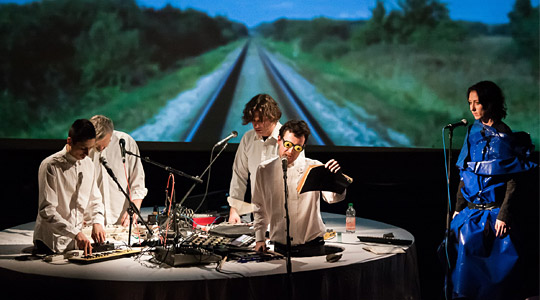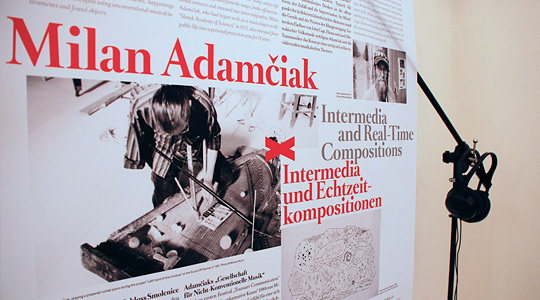Sound Exchange
Experimental Music Cultures in Central and Eastern Europe

Sound Exchange began its search for the roots and current state of experimental music culture in Central and Eastern Europe in 2010, pursuing commonalities and singularities found within these regions and discussing their relationship with the international history of experimental music. Aiming at rendering local lines of development visible again and encouraging artists to reconnect to these traditions, Sound Exchange produced a series of festivals, exhibitions and workshops in Poland, Slovakia, Estonia, Lithuania, Latvia, Hungary, Germany and the Czech Republic, in close collaboration with local initiatives in each country. CTM 2014 presents some of the findings and achievements of the extensive project through a special condensed programme at the festival, and links it into further dialogue with parallel developments in Russia and the West.
Central and Eastern Europe boasts a lively, internationally networked scene of musicians and artists, festivals and local centers of experimental media-based music and audio arts. The long traditions of experimental music cultures in these regions have, however, been difficult to access until recently. While the often barely-known musical and artistic positions forged by various pioneering protagonists presented in the Sound Exchange programme exhibit a wide stylistic and aesthetic spectrum of electro-acoustic music, composed and improvised music, musical media art and audio art, local compositional or artistic sound traditions play a relatively small role in each country’s cultural memory. This is a result of decades-long political repression during the region’s socialist period in which experimental techniques were usually undervalued, or perhaps even more so due to the violent break with established practices following the fall of the iron curtain in 1989, when biographies got disrupted, networks and institutions broke down, and globally used digital practices inevitably became the focal point of an urgent desire to “catch-up”. An atmosphere of gradually-increasing openness and international networking has progressively connected scenes and protagonists to their fellows in the west ever since, while barely giving local identity its due.
As a result, the younger generation of musicians is very often more focused on the 'west' with relatively few connections to local traditions, while the international music community remains drastically under-informed.
Such was the hypothesis of German musicologist Golo Föllmer, who conducted his research in eight Central and Eastern European countries for over half a year in 2010 following an invitation by the Goethe-Institut. Föllmer’s work served as a starting point for Sound Exchange, a two-year trans-regional music project involving many local initiatives and protagonists in and between the cities that had been visited by the researcher: Budapest, Bratislava, Prague, Krakow, Riga, Vilnius, Tallinn, and Chemnitz. Summoned by the project’s curators, Carsten Seiffarth and Carsten Stabenow of Dock e.V., and enabled through support by the Goethe-Institut and The Federal Cultural Foundation of Germany, these local artists, curators, and independent producers started to gather and publicize information on the roots of their respective experimental music cultures, encouraging younger artists to interact with these roots in an attempt to reconnect current music practices to their local identities and history.
Over the course of one year, festivals, events, installations and workshops organized in collaboration with these groups and linking these diverse scenes were held under the Sound Exchange umbrella. Context-specific programmes were developed in each city, and touched on topics such as electronic sound experiments, Dadaist happenings and new wave, minimal music, Fluxus, experimental electroacoustic music, graphic notations, or real-time improvisation. The project culminated in a festival held in the East-German city of Chemnitz, which interwove modules from each of the previous events.
The initiative has been extensively documented via an audiovisual blog as well as the Anthology of Experimental Music Cultures in Central and Eastern Europe 1950-2010, published both online and as a 400-page book.

At CTM 2014, a special two-day Sound Exchange concert and performance programme at the HAU Hebbel am Ufer (HAU2) brings a selection of projects by younger-generation Eastern European artists working in resonance (or in contrast) with their pioneering counterparts.
The Sound Exchange exhibition in the Foyer of HAU2 provides further context by presenting individual artistic positions, regional groupings, and currents in Central and Eastern Europe’s experimental musical cultures from the 1960s to the present. Through various documents, images, and sounds, eight exemplary pioneers and their works are portrayed in regional and historical context, as are their underlying artistic processes and positions.
An afternoon programme regrouping lectures, a round-table discussion, and a specially-commissioned film programme focused on the late GDR underground scene that presents rare and never before seen film and video documents, gives the possibility for in-depth reflection and debate. Further examinations of musical developments elsewhere in the East and West will unfold throughout various other events within CTM 2014’s Discourse series.
Sound Exchange at CTM 2014 is a collaboration with Dock e.V. With the kind support of the Lithuanian Composers’ Union, The Polish Institute in Berlin, and the Culture Capital Foundation of Latvia.



